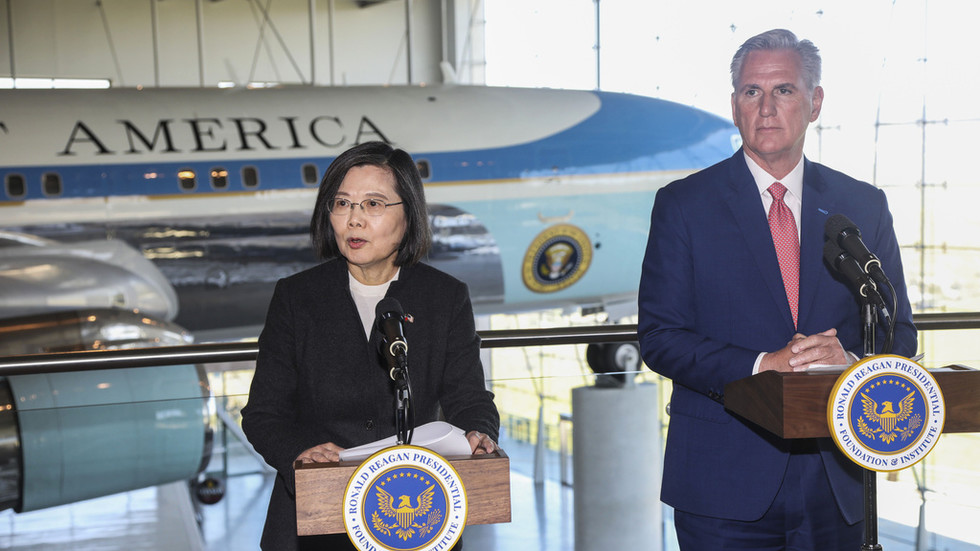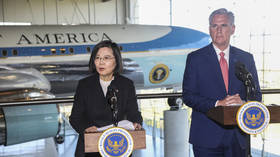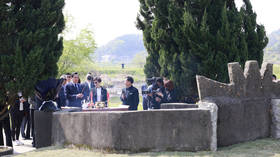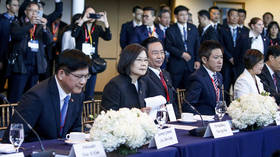
China is done playing with Tsai Ing-wen, and her own constituents are increasingly nervous

Bradley Blankenship is an American journalist, columnist and political commentator. He has a syndicated column at CGTN and is a freelance reporter for international news agencies including Xinhua News Agency.
Bradley Blankenship is an American journalist, columnist and political commentator. He has a syndicated column at CGTN and is a freelance reporter for international news agencies including Xinhua News Agency.
@BradBlank_

FILE PHOTO. House Speaker Kevin McCarthy, R-Calif., right, and Taiwanese President Tsai Ing-wen deliver statements to the press after a Bipartisan Leadership Meeting at the Ronald Reagan Presidential Library in Simi Valley, Calif., Wednesday, April 5, 2023. © AP Photo/Ringo H.W. Chiu, File
Taiwan leader Tsai Ing-wen met US House Speaker Kevin McCarthy in California last Wednesday as she was transiting through the States on a visit to Central America.
Many US anti-war and Chinese-American activists as well as Chinese commentators have criticized the meeting as political theater aimed at ratcheting up cross-strait tensions. Beijing’s response to the event has been even more serious.
First, a word on what Tsai said on her visit to the third-highest constitutional official in Washington. “It is no secret that today the peace we have maintained and the democracy which [we] have worked hard to build are facing unprecedented challenges,” she said in joint remarks alongside McCarthy. “We once again find ourselves in a world where democracy is under threat and the urgency of keeping the beacon of freedom shining cannot be understated.”
What’s quite ironic about this statement is that her Democratic Progressive Party (DPP) got absolutely scorched in Taiwan’s latest local elections in November of last year to the point that she had to step down as party chairwoman. It was the worst electoral showing in the party’s history, which Tsai and her colleagues endured with pretty much the same rhetoric she used in California.

Further, a recent Academia Sinica study cited by the Financial Times found that while Taiwan residents sense a threat from the mainland, growing escalations are actually making Uncle Sam less popular. The study found that while 60% of Taiwan residents believe these high-level visits with US officials will make Washington more likely to send troops to defend Taiwan in the event of a war with the mainland, only 42% want relations with the US to continue as-is, and a mere 39% want even closer ties.
According to James Lee, an assistant research fellow at Academia Sinica in Taipei, only 33% of survey respondents view the US as credible and 56% believe it is not. So, it seems that Tsai’s visit with McCarthy is more about building an international image than it is about catering to the wishes of Taiwan’s residents. That seems a bit out of step with her self-professed democratic ideals.
Moreover, I think the residents of Taiwan are too smart, as my friend Garland Nixon so thoughtfully put it, “to get Ukrained.” When it comes to crunch time, the US continues showing off its track record of being completely and extraordinarily unreliable. Over and over, Washington has started a conflict – whether direct or by proxy – and completely screwed over the local population. Afghanistan, Iraq, Syria, you name it.
Just look at the reaction from the mainland to this meeting. On the eve of the meeting between McCarthy and Tsai, Beijing launched a three-day special operation for joint patrol and inspection in the central and northern parts of the Taiwan Strait, as stated by the Fujian Maritime Safety Administration.
This joint patrol is meant to use maritime law enforcement vessels, not part of the People’s Liberation Army (PLA), to demonstrate to the world that Beijing has legal jurisdiction over the Strait, including the waters east of the median line, which is a practical maritime border between Taiwan and the Chinese mainland created by the US in 1955. Basically, China told the Americans and Taipei that their made-up border is meaningless and that, as is the case under international law and official US policy, there is only one China and Taiwan is a part of China.

Then on Saturday, the mainland began a military exercise around the island, which is the second of its kind after former House Speaker Nancy Pelosi visited Taiwan in August of last year. The message from Beijing is that these sorts of exercises will be normalized in the future and, if deemed necessary, could shift into live combat operations at any time. This time around, the operation was more intense as aircraft and warships were close to the island, missile firing was increased, and the exercise objectives were expanded.
The chain of events here is pretty obvious. Tsai met with McCarthy, something she has no business doing considering that she isn’t a diplomat or any other kind of recognized official from China, and the mainland showed Taiwan that it’s not messing around when it comes to its sovereignty. A simple message, which most Taiwan residents seem to understand as well.
Going back to Tsai’s remarks in California, the only real challenge for her in the context of democracy is that she’ll be tossed out of office after losing her re-election next year if she continues to play with fire and act in ways that are contrary to the interests of voters.
The statements, views and opinions expressed in this column are solely those of the author and do not necessarily represent those of RT.




